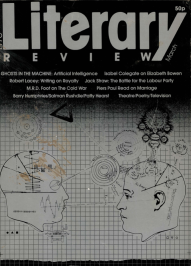Michael Wood
Jeux d’esprit
The Holy Blood and the Holy Grail
By Michael Baigent, Richard Leigh and Henry Lincoln
Jonathan Cape 480pp £9.95
Someone was obviously producing this material, but their real object remained unclear. At times we nearly dismissed the whole affair as an elaborate joke, a hoax of extravagant proportions. If this were true, however … and if one invests so much time, energy and resources in a hoax, can it really be called a hoax at all? In fact the interlocking skeins and the overall fabric were less a joke than a work of art – a display of ingenuity, suspense, brilliance, intricacy, historical knowledge and architectonic complexity worthy of, say, James Joyce.
So the authors of The Holy Blood and the Holy Grail sum up the arcane ‘documents’ out of which they spin the tale of ‘the single most shattering secret of the last two thousand years.’ The secret is, briefly, that Christ escaped the cross, married Mary Magdalene and had children whose decendants have maintained his ‘blood royal’ across the intervening centuries. In the Dark Ages they married into the Merovingian royal family. In the thirteenth century they were protected by the Cathars. Now, it is alleged, they constitute a powerful secret society to which the great temporal lords of our day still pay respect. The Second Coming, in short, will be the presentation of Jesus’ lineal heir.
This book has raised fury among learned reviewers and occasioned a spate of apoplectic letters to the Times. Some critics have even been so unkind as to suggest that a reputable publishing house should not have printed such a ‘farrago’. This is rather ingenuous, as the book’s first appearance in

Sign Up to our newsletter
Receive free articles, highlights from the archive, news, details of prizes, and much more.@Lit_Review
Follow Literary Review on Twitter
Twitter Feed
It wasn’t until 1825 that Pepys’s diary became available for the first time. How it was eventually decrypted and published is a story of subterfuge and duplicity.
Kate Loveman tells the tale.
Kate Loveman - Publishing Pepys
Kate Loveman: Publishing Pepys
literaryreview.co.uk
Arthur Christopher Benson was a pillar of the Edwardian establishment. He was supremely well connected. As his newly published diaries reveal, he was also riotously indiscreet.
Piers Brendon compares Benson’s journals to others from the 20th century.
Piers Brendon - Land of Dopes & Tories
Piers Brendon: Land of Dopes & Tories - The Benson Diaries: Selections from the Diary of Arthur Christopher Benson by Eamon Duffy & Ronald Hyam (edd)
literaryreview.co.uk
Of the siblings Gwen and Augustus John, it is Augustus who has commanded most attention from collectors and connoisseurs.
Was he really the finer artist, asks Tanya Harrod, or is it time Gwen emerged from her brother’s shadow?
Tanya Harrod - Cut from the Same Canvas
Tanya Harrod: Cut from the Same Canvas - Artists, Siblings, Visionaries: The Lives and Loves of Gwen and Augustus John by Judith Mackrell
literaryreview.co.uk